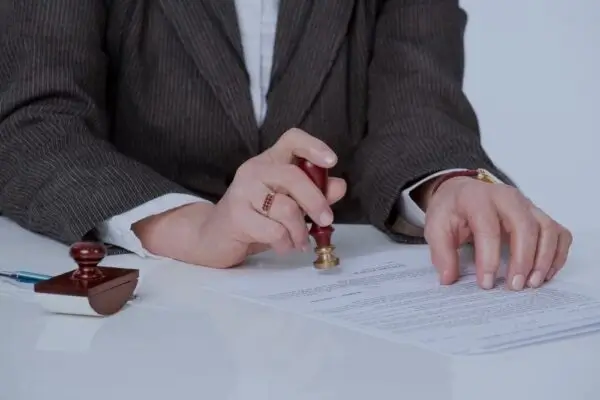
€5 discount?
Discount code: KORTING

The role of apostilles in certified translations: a guide
A sworn translation is a translation that includes a statement from a sworn translator. This statement confirms that the translation is an accurate representation of the original document. Sworn translations are often used for official documents that need to be translated for legal purposes or official authorities.
To create a sworn translation to be recognized by foreigners governments or authorities, it may be necessary to apostille to obtain. In this article we will explore the role of apostilles bee sworn translations explore and provide a guide to obtaining one apostille.
What is an apostille?
A apostille is an internationally recognized form of legalisation which is used to confirm the authenticity of a public document. The Apostille Convention, established in 1961, makes it easier for documents issued in one country to be recognized in other countries without the need for further legalisation.
Why is an apostille needed for certified translations?
Sworn translations should often be used in countries that have signed the Apostille Convention. In these countries a sworn translation immediately apostille considered a valid document and accepted by official bodies.
How do you get an apostille for a certified translation?
To create a apostille available for one sworn translation, you must contact the competent authority in the country where the original document was issued. This authority will confirm the authenticity of the sworn translator's signature and a apostille attach to the document.
Conclusion
Obtaining one apostille for a sworn translation is essential to ensure the validity of the document in countries that have signed the Apostille Convention. By following the right steps and consulting the appropriate authority, you can ensure that your sworn translation is recognized and accepted by official bodies.
Frequently asked questions
What is the difference between an apostille and legalization?
A apostille is a specific form of legalisation which is recognized by countries that have signed the Apostille Convention. Legalization is a general term referring to the process of confirming the authenticity of a document for use abroad.
Must every sworn translation be provided with an apostille?
Not all countries require one apostille for sworn translations. It is important to check the specific requirements of the country where the document will be used before obtaining one apostille requests.
A apostille stands for an official one statement that on one sworn translation is added to confirm its authenticity. It is a certificate that is issued by a competent authority, such as a notary or judicial officer. The apostille ensures that the sworn translation is legally valid and recognized abroad. This is especially important with legal documents, such as acts, contracts and diploma's.
Obtaining one apostille can differ per country and it is important to follow the correct procedure in advance. In the Netherlands the apostille issued by the court and applies to documents drawn up in the Netherlands. For documents drawn up abroad, you should contact the competent authority in that country.
It is very important to apostille directly at the sworn translation so that the legal validity and authenticity of the document are guaranteed. Without apostille can a sworn translation may not be recognized abroad and this can have serious consequences, especially in legal matters.
It is wise to apply for one sworn translation immediately indicate that there is also one apostille is needed. This way the translation agency or translator can here account and ensure that the document is complete and legally valid. It may also be useful to obtain information in advance about the specific requirements and procedures for obtaining one apostille in the country in question.
It is important to emphasize that a apostille is not a translation, but a statement which guarantees the authenticity of a sworn translation confirms. It is therefore a supplementary document that, together with the sworn translation must be submitted to authorities abroad. Without apostille can a sworn translation may not be accepted and that can have major consequences.
It is advisable to always engage a professional translation agency or sworn translator when having important documents that need to be translated for legal purposes. They know exactly what is needed and can ensure that the sworn translation inclusive apostille is delivered correctly. It is important not to take any risks and ensure that all necessary documents are present and correct. A apostille can therefore play a crucial role sworn translations and can ensure that your documents are legally valid abroad.





Sworn translations
129 Products
CV, cover letters
2 Products
Financial translations
4 Products
Legal translations
130 Products
Multimedia
13 Products
Notarial translations (notary)
11 Products
Sworn translations
Trade register extract translation (sworn)
Sworn translations
Certificate of conduct translation (sworn)
Sworn translations
Diploma translation (sworn)
Sworn translations
Bank statement translation (sworn)
Sworn translations
Notarial deed translation (sworn)
Sworn translations
Translate death certificate (sworn)
Sworn translations
Translate birth certificate (sworn)
Sworn translations
Translation of marriage certificate (sworn)
Sworn translations
Extract from the register of births, deaths and marriages (BRP) translated (sworn)
Sworn translations
Translate divorce certificate (sworn)
Sworn translations
Certificate of inheritance translation (sworn)
Sworn translations
Legal document (sworn)
Sworn translations
Translation of marriage contracts (sworn)
Sworn translations
Grade list translation (sworn)
Sworn translations
Passport translation (sworn)
Sworn translations
Translate identity document (sworn)
Sworn translations
Translation of wills (sworn)
Legal translations
Translate general terms and conditions (unsworn)
Sworn translations
Order translation (sworn)
Sworn translations
Translate driving licence (sworn)
Sworn translations
Power of attorney translation (sworn)
Sworn translations
Declaration of Dutch citizenship translated (sworn)
Sworn translations
Declaration translation (sworn)
Sworn translations
Residence permit translation (sworn)
Sworn translations
Translate medical records (sworn)
Sworn translations
Child recognition declaration translated (sworn)
Sworn translations
Translate unmarried declaration (sworn)
Sworn translations
Translate tax returns (sworn)
Sworn translations
Translate deed of sale (sworn)
Sworn translations
Translate statutes (sworn)